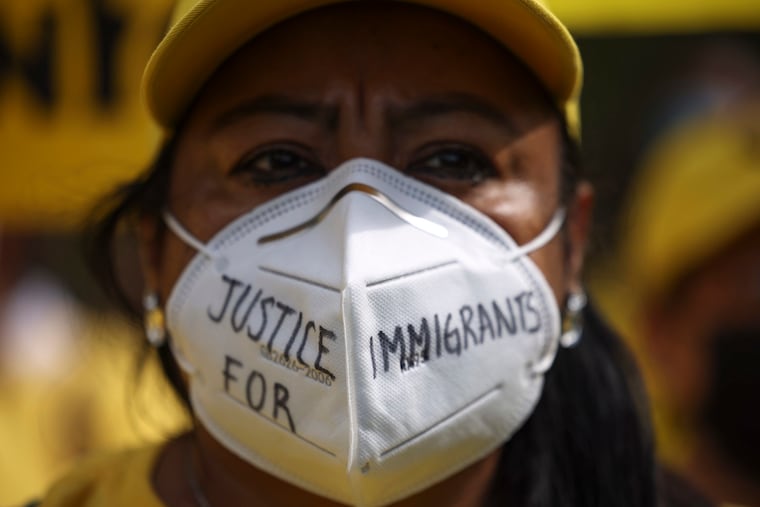Undocumented immigrants need whistleblower protections
Immigrant labor is warmly welcomed by employers. Their humanity? Not so much.

They are our nannies and house cleaners. They care for our seniors and people with disabilities. They make our food, paint our houses, patch our roofs, and even clean up after climate catastrophes. They harvest the egg, raise and slaughter the chicken. They are some of the valiant workers — the essential workers — who, at great risk and cost to themselves, kept us going through the pandemic. Even the commercial labs that process our COVID-19 tests rely on this workforce.
America runs on immigrant labor. And yes, many of these workers are undocumented. Here is where the hypocrisy comes in: Even though our families depend on these workers to be able to afford middle-class lifestyles, and businesses depend on their labor to deliver goods and services reliably and cheaply, we also rely on their precariousness.
In New Jersey, while undocumented immigrants make up approximately 6% of the population, they account for 15.7% of the workforce in service sector industries including restaurants, retail, hotels and lodging, personal care services, and child care. In Pennsylvania, 9% of frontline workers are foreign-born, 9% work in the trucking and warehouse industry, and 19% in building cleaning.
Many workers have been here for years. In Pennsylvania, the Migration Policy Institute estimates that 48% of undocumented immigrants have been living here for more than a decade, often taking on some of the lowest paying essential work and contributing to their local communities.
They cannot legalize their status because Congress has been gridlocked on immigration reform for a quarter century. Peruse the most recent family-based visa allotments, by far the easiest way to come to the United States, and you’ll find that the current wait time for an F-1 visa applicant from Mexico is 22 years. Employment visas, in general, are too low — just 140,000 per year — but there’s an absurd cap of 5,000 per year on the number designated for “low-skill” workers.
Our country previously had a way for people to legalize their status once here, but three- and 10-year bars enacted during the 1990s have made it all but impossible to do so. These bans require people who have been in the country illegally for a year or less to leave the country for three years, while anyone who has been here longer than that must leave for 10 years.
What parent is going to step forward if it means leaving their children for as long as a decade? And what child would want to be away from their families? I’ve had undocumented students who mourned their limited employment opportunities after graduation, but agonized more about being separated from their families.
Most undocumented workers have come here under the same set of circumstances that drove our grandparents to do so: persecution, hunger, violence, war, the hope of better opportunities for their children, and the powerful lure of democracy.
Their labor is warmly welcomed by employers. Their humanity? Not so much.
Some employers exploit their immigration status to steal wages, place workers in unsafe working conditions, and commit sexual harassment. When workers organize and come forward to report wage theft or egregious injury, they frequently face retaliation ranging from drastic reductions in their hours to firing, blacklisting, and being threatened with deportation. Coworkers are less likely to come forward when they see what happens to those who do.
The Biden administration has started to take steps in the right direction. In a memo issued in October, the Department of Homeland Security asserted that immigration enforcement authority “shall not be used as an instrument of unscrupulous employers seeking to exploit their employees’ immigration status.” The memo also said Homeland Security must adopt policies that facilitate the enforcement of wage protections, workplace safety, and the right to organize.
The National Labor Relations Board has been out in front on this: already releasing guidance clarifying the process by which workers can seek support for immigration protections. This means that when two or more workers in the Philadelphia area ask their employer for their wages owed, or to address a workplace hazard, and they are threatened with deportation, they will have recourse. The administration took another positive step on July 6 with the announcement of a new Department of Labor process for seeking immigration-related protection for workers in labor cases.
» READ MORE: Undocumented essential workers need a clearer path to citizenship
Homeland Security must take action to address employer retaliation and grant whistleblower protections that would stop deportations and provide work authorizations. It often takes time for government agencies to investigate wage and hour violations, health and safety violations, workplace discrimination, and unfair labor practice cases, but they cannot prevail if the plaintiffs have been deported or cast back into the shadows to avoid detection.
As the National Day Laborer Organizing Network so eloquently put it, “For decades, immigration enforcement has been weaponized to undermine workers’ rights to the detriment of the entire workforce … whenever the Department of Homeland Security arrests and deports a worker who has experienced some form of labor abuse, they are lowering the floor of labor standards for all workers.”
All workers depend on the preservation of basic labor standards, and all businesses who treat their employees with fairness and dignity benefit when workers who blow the whistle are protected.
Janice Fine is a professor and the director of the workplace justice lab@RU in the School of Management and Labor Relations at Rutgers, The State University of New Jersey. @janicefine6